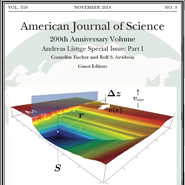Special Andreas Lüttge issue of "American Journal of Science"

Research in fluid-solid interaction processes has expanded tremendously over the past few decades, with key fronts ranging from fundamental understanding of reaction kinetics to detailed predictions involving the release, migration, and retention of environmentally important components. This special issue of AJS showcases the diversity and progress of this research in a series of invited papers that also illustrate core problems and solutions.A central theme is the challenge involved in the integration of reaction processes over length and time scales that span many orders of magnitude. At one end of this spectrum, both theoretical and modeling approaches have evolved to describe the very brief interactions at the molecular scale, allowing key insights into details of reaction mechanism. At the other, modeling approaches have focused on the longer reaction times and lengths that characterize macroscopic systems. Experimental and analytical observations are also now able to map the dynamics and reactivity of reacting surfaces at the pore scale and above, providing these modeling approaches with essential feedbacks towards validation of predictions and identification of aspects where improvement is needed. The strong coupling between the two “worlds” of experimental and simulation approaches is perhaps the most important result of the last years of research in this field. A primary motivation for this special issue was to highlight this productive interaction. A second motivation was to mark the 60th birthday of Professor Andreas Lüttge. Starting his scientific work at Tübingen University, followed by appointments at Yale University, Rice University, and now at the University of Bremen, he has continued to pursue the productive synergy of these two activities via pioneering work combining kinetic Monte Carlo simulations with complementary observations of reacting mineral surfaces. (Text by Cornelius Fischer)
Further information:

